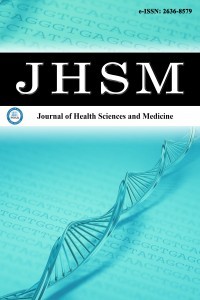Preoperative pulmonary rehabilitation in medical inoperable patients with early stage non-small cell lung cancer and postoperative results
Preoperative pulmonary rehabilitation in medical inoperable patients with early stage non-small cell lung cancer and postoperative results
___
- Lee S, Roknuggaman M, Son JA, et al. Prognostic impact of postoperative complications in high-risk operable non-small cell lung cancer. J Chest Surg. 2022;55(1):20-29.
- Ferreira V, Minnella EM, Awasthi R, et al. Multimodal prehabilitation for lung cancer surgery: a randomized controlled trial. Ann Thorac Surg. 2021;112(5):1600-1608.
- Benzo R, Wigle D, Novotny P, et al. Preoperative pulmonary rehabilitation before lung cancer resection: results from two randomized studies. Lung Cancer. 2011;74(3):441-445.
- Licker M, Karenovics W, Diaper J. Short-term preoperative high-intensity interval training in patients awaiting lung cancer surgery: a randomized controlled trial. J Thorac Oncol. 2017;12(2):323-333.
- Licker M, Schnyder JM, Frey JG, et al. Impact of aerobic exercise capacity and procedure-related factors in lung cancer surgery. Eur Respir J. 2011;37(5):1189-1198.
- Lababede O, Meziane MA. The eighth edition of TNM staging of lung cancer: reference chart and diagrams. Oncologist. 2018;23(7):844-848.
- Kaymaz D, Ergün P, Candemir I, Gülhan SE, Fındık G, Demir N. Efficacy of preoperative comprehensive pulmonary rehabilitation in patients with lung cancer. Phys Med Rehabil Int. 2016;3(6):1103-1115.
- Siegel RL, Miller KD, Jemal A. Cancer statistics, 2018. CA Cancer J Clin. 2018;68:7-30.
- Sherwood JT, Brock MV. Lung cancer: new surgical approaches. Respirology. 2007;12:326-332.
- Licker M, Karenovics W, Diaper J. Short-term preoperative high-intensity interval training in patients awaiting lung cancer surgery: a randomized controlled trial. J Thorac Oncol. 2017;12(2):323-333.
- Cavalheri V.Granger C. Preoperative exercise training for patients with non-small cell lung cancer. Cochrane Database Syst Rev. Coc. 2017;6(6):CD012020.
- Nagarajan K, Bennett A, Agostini P, Naidu B. Is preoperative physiotherapy/pulmonary rehabilitation beneficial in lung resection patients? Interact Cardiovasc Thorac Surg. 2011;13(3):300-302.
- Varela G, Ballesteros E, Jiménez MF, Novoa N, Aranda JL. Cost-effectiveness analysis of prophylactic respiratory physiotherapy in pulmonary lobectomy. Eur J Cardio-thorac Surg. 2006; 29(2):216-220.
- Li X, Li S, Yan, S. Impact of preoperative exercise therapy on surgical outcomes in lung cancer patients with or without COPD: a systematic review and meta-analysis. Cancer Manag Res. 2019;11:1765-1777.
- Bibo L, Goldblatt J, Merry C. Does preoperative pulmonary rehabilitation/physiotherapy improve patient outcomes following lung resection? Interact Cardiovasc Thorac Surg. 2021;32(6):933-937.
- Lai Y, Wang X, Zhou K, Su J, Che G. Impact of one-week preoperative physical training on clinical outcomes of surgical lung cancer patients with limited lung function: a randomized trial. Ann Transl Med. 2019;7(20):544-544.
- Laurent H, Aubreton S, Galvaing G, et al. Preoperative respiratory muscle endurance training improves ventilatory capacity and prevents pulmonary postoperative complications after lung surgery. Eur J Phys Rehabil Med. 2020;56(1):73-81.
- Fernando HC, Timmerman R. American College of Surgeons Oncology Group Z4099/Radiation Therapy Oncology Group 1021: a randomized study of sublobar resection compared with stereotactic body radiotherapy for high-risk stage I non-small cell lung cancer. J Thorac Cardiovasc Surg. 2012;144(3):S35-S38.
- Pouwels S, Fiddelaers J, Teijink JA, Woorst JF, Siebenga J, Smeenk FW. Preoperative exercise therapy in lung surgery patients: A systematic review. Respir Med. 2015;109(12):1495-1504.
- Hulzebos EH, Smit Y, Helders PP, Meeteren NL. Preoperative physical therapy for elective cardiac surgery patients. Cochrane Database Syst Rev. 2012;11(11):CD010118.
- McCarthy B, Casey D, Devane D, Murphy K, Murphy E, Lacasse Y. Pulmonary rehabilitation for chronic obstructive pulmonary disease. Cochrane Database Syst Rev. 2015;23;2015(2):CD003793.
- Yayın Aralığı: Yılda 6 Sayı
- Başlangıç: 2018
- Yayıncı: MediHealth Academy Yayıncılık
Is rheumatoid arthritis a neglected comorbidity in neurofibromatosis type 1?
Adem ERTURK, Alper SARI, Ali İzzet AKÇİN, Ali Sadri UYSAL, Muhsin ELMAS, Çağrı TURAN
Evaluation of the readability of consent forms used in cardiovascular surgery clinics
Quality, reliability, and content assessment of YouTube™ videos associated with aphasia
İbrahim Can YAŞA, Gözde MALKOÇ
The role of carbondioxide insufflation in preventing postoperative peritoneal adhesions in rats
Harun KARABACAK, Murat AKIN, Tonguç Utku YILMAZ, Güldal YILMAZ, Özlem GÜLBAHAR
A detailed analysis of thyroid disorders in autoimmune liver diseases
Çağlar KESKİN, Asena GÖKÇAY CANPOLAT, Şule CANLAR, Murat CİNEL, Özgür DEMİR, Mustafa ŞAHİN, Rıfat EMRAL, Onur KESKİN, Demet ÇORAPÇIOĞLU
Seray HAZER, Seher SATAR, İpek CANDEMİR, Pınar ERGÜN, Leyla Nesrin ACAR, Selim Şakir Erkmen GULHAN
